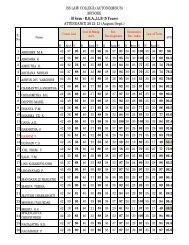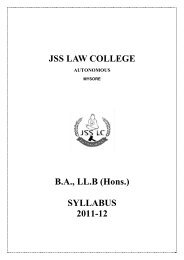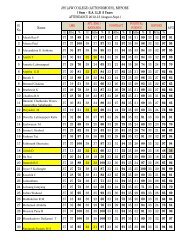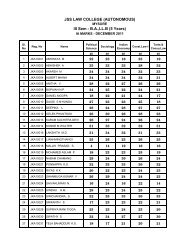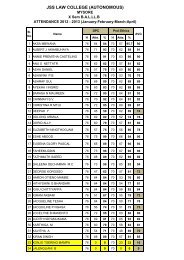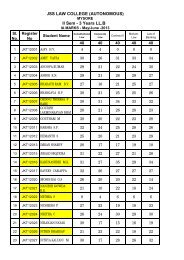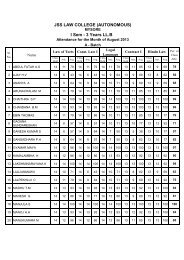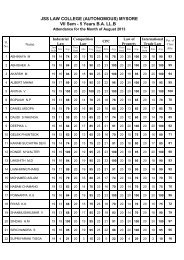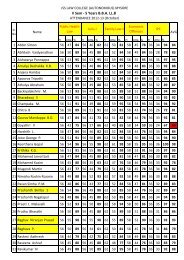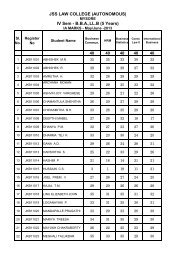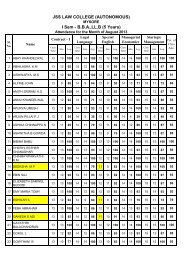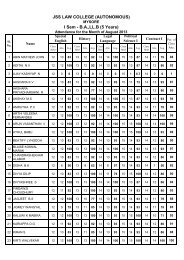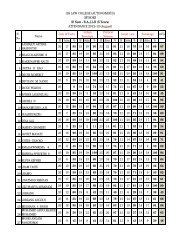Surana & Surana National Corporate Law Moot ... - JSS Law College
Surana & Surana National Corporate Law Moot ... - JSS Law College
Surana & Surana National Corporate Law Moot ... - JSS Law College
Create successful ePaper yourself
Turn your PDF publications into a flip-book with our unique Google optimized e-Paper software.
vi. The principles laid down under Part IV of the Constitution of India is mere directive and is<br />
neither binding nor enforceable especially when the compliance of Article 51(c) of the<br />
Constitution would jeopardize the sovereignty of India’s power to legislate statutes to<br />
safeguard its revenue interests. Further, Article 51 only expects that the State shall endeavor<br />
to comply with any treaty obligation and does not compel it to do so especially when India’s<br />
interests are at risk.<br />
12. Making the above observations, the DDIT passed an order levying tax at the rate of 20% being<br />
long term capital asset along with applicable surcharge and cess amounting to INR 2,060 crores.<br />
Further, a penalty equivalent of the tax payable was also levied under section 230 of the Code.<br />
Further, interest under section 214 of the Code was also levied.<br />
13. Against the impugned order, the assessee/ YPT immediately filed a writ petition in the Bangalore<br />
High Court vide W.P. No. 99999/ 2012 inter alia praying that:<br />
i. the order of the DDIT is non est in law and has flagrantly violated the settled principles of<br />
Indian income-tax law and has traveled beyond its territorial limits by applying on a<br />
transaction happened completely out of India;<br />
ii. the order has overtly violated the obligation of international treaty obedience and comity and<br />
has opened the Pandora box of transgressing the directive principles of state policy of the<br />
Constitution of India;<br />
ii. the order is patently per incuriam of the order of the Supreme Court of India upholding the<br />
validity of the India-Mauritius tax treaty;<br />
iv. the assessee in its writ petition challenged the constitutional validity of the provisions of<br />
GAAR of the Code which empowers the tax department to disregard an arrangement and<br />
restructure it in its own style stepping into the shoes of the corporations and thereby,<br />
declaring any transaction as sham and a colorable device. Also, it challenged the provisions<br />
of section 5of the Code in so far as it permits the taxation of sale of underlying capital assets<br />
in India on a transaction completely happening outside India<br />
v. to quash the order the passed by the DDIT and hold that the DDIT had no jurisdiction to issue<br />
the SCN and pass the impugned order<br />
14. After detailed hearing and consideration, the Hon’ble High Court dismissed the writ petition<br />
upholding the validity of the Code and held that as long as an extra territorial transaction has any<br />
nexus with Indian assets, then it is deemed to be Indian source income and therefore, taxation by<br />
source country is an accepted principle in international taxation. Further, the court held the<br />
directive principles of state policies under Part IV of the Constitution is unenforceable by any<br />
court and it is the prerogative of the State to decide as to when the treaty obligations could be<br />
overstepped especially when the interests of the country is at peril. However, the court directed<br />
the income-tax department not to indulge in any tax recovery proceedings until the matter<br />
approaches the Supreme Court if the aggrieved party prefers any special leave petition.<br />
5



